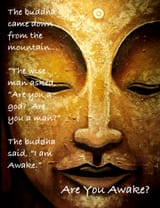>>16779701
I really do appreciate it. It's the most intellectually honest spiritual book I've ever read. The issue I've had with Christianity (well one of them, at least) is the dubious logical conclusions one is forced to make based on the way it lays out metaphysics in a sloppy and short sighted manner. For example to my understanding of modern Christian doctrine, a genocidal lunatic could kill ten million unsaved men, dooming them to an ETERNITY of hellfire and suffering, then repent and go to paradise. And the only real response to this apparent glaring flaw is "mysterious ways".
The end goal of Buddhism makes more sense to me. To escape the cycle altogether, accurately identifying the flawed nature of existence itself. And the very first lines openly state that mind/awareness is fundamental, which is also resonant with the truth.
Buddha did the intelligent thing and simply remained silent on those matters beyond our knowledge rather than making bold claims that could eventually be disproven. Obviously I'm not at all initiated at this point, but from what I have read so far, it seems to be the most timeless and self-consistent encapsulated metaphysical/spiritual framework I've ever seen outlined.
>It is literally just really, really smart dudes who sat around doing nothing but thinking for 1000's of years who wrote a manual on how the best way to do everything is
It is phenomenal. From my rough understanding so far: there's essentially 4 layers on which to interpret the guide?
1) basic morality/ethics/guidelines for living a good life
2) addressing the failings of common morality and resolving the apparent contradiction which we see where righteous suffer and wretched thrive in reality
3) addressing the final issue which is that even a "good" life is ultimately lacking/empty/devoid
4) escaping the cycle entirely
Do you have any further recommended reading?

